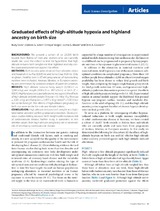Graduated effects of high-altitude hypoxia and highland ancestry on birth size
Fecha
2013-10-02Autor
Soria, Rudy
Julian, Colleen Glyde
Vargas, Enrique
Moore, Lorna G
Giussani, Dino A
Metadatos
Mostrar el registro completo del ítemResumen
Background: We present a cohort of ca. 25,000 birth
records from Bolivia of men and women who are currently
adults. We used this cohort to test the hypothesis that high
altitude reduces birth weight and that highland ancestry confers graduated protection against this effect.
Methods: Birth records were obtained from obstetric clinics
and hospitals in La Paz (3,600 m) and Santa Cruz (420 m). Only
singleton, healthy term (>37 wk) pregnancies of nonsmoking
mothers were included. Andean, Mestizo, or European ancestry was determined by validated analysis of parental surnames.
results: High altitude reduced body weight (3,396 ± 3 vs.
3,090 ± 6 g) and length (50.8 ± 0 vs. 48.7 ± 0 cm) at birth (P <
0.001). Highland ancestry partially protected against the effects
of high altitude on birth weight (Andean = 3,148 ± 15 g; Mestizo
= 3,081 ± 6 g; and European = 2,957 ± 32 g; trend P < 0.001) but
not on birth length. The effects of high-altitude pregnancy on
birth size were similar for male and female babies.
conclusion: High altitude reduces birth weight and highland native ancestry confers graduated protection. Given previous studies linking reduced birth weight with increased risk
of cardiovascular disease, further study is warranted to test
whether adults from high-altitude pregnancy are at increased
risk of developing cardiovascular disease.

